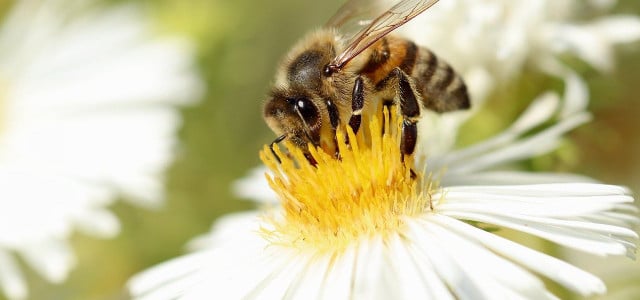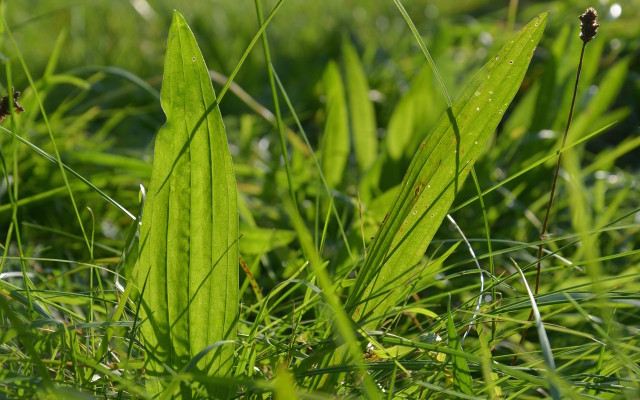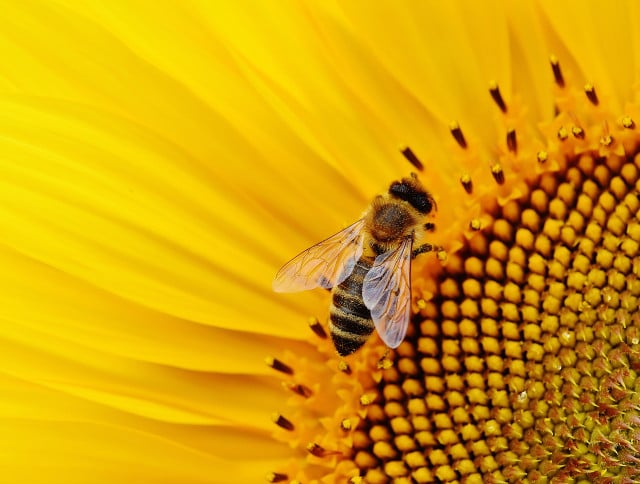
Did you accidentally step on or sit on a bee? We’ll show you the most effective home remedies you can use to treat your bee sting naturally.
In summer, you often walk barefoot, for example across the lawn at the outdoor pool – and it’s happened. Unlike wasps, bees are not aggressive. Their stings are merely a defensive reaction that is fatal for the animal itself. But a bee sting can also have serious consequences for the person stung if they are allergic to bee venom. In such cases, medical help is necessary.
In most cases, however, common home remedies are sufficient and can at least provide relief. In this article, you will learn how to treat a bee sting.
How to treat a bee sting
- If you are stung by a bee, you must first remove the stinger, which is probably still in the skin thanks to its barb. The best way to do this is with tweezers, but your fingernails will do in a pinch. Be careful not to crush the venom sac on the stinger, otherwise the rest of the venom will spill into the wound.
- Then you should cool the sting immediately – ideally with the help of a cold pack or ice cubes. You should wrap both in a clean cloth so that you don’t freeze your skin. The cold causes the blood vessels to constrict, itching and pain as well as swelling to decrease.
-
Heat can also provide relief: proteins in bee venom break down at temperatures of around 45 degrees. Hot metal – such as a spoon or a coin – or a cloth soaked in hot water can also provide relief. But be careful: don’t burn yourself.
Natural home remedies for swelling and itching

(Photo: CC0 Public Domain / Pixabay / cornelinux)
Otherwise, the same applies as with most other insect bites – you can also treat a bee sting with some home remedies:
- Put a freshly cut onion on the sting until the symptoms subside – this is a tried and tested home remedy. The onion juice has an antibacterial effect and disinfects the wound.
- You can also treat bee stings with aloe vera gel: it relieves the itching.
-
Plantain leaves have been used for generations to treat all kinds of insect bites and are ideal if you get stung by a bee while out and about. They grow practically everywhere and all you need to do is crush them and dab the plant juice onto the bee sting.
- Treat the bee sting with a cool compress containing salt water. This will reduce the swelling.
-
Vinegar compresses made from one part vinegar and two parts water cool and disinfect the bee sting.
Bee stings are better prevented than treated

(Photo: CC0 / Pixabay / katja)
But the best thing is to avoid a sting in the first place! If you follow a few of these measures, you and the bee will be spared unnecessary suffering and you won’t have to treat the bee sting at all:
-
Sweet, floral scents attract bees and other insects, so avoid wearing perfume in summer.
- If a bee does feel attracted and becomes intrusive, stay calm and do not lash out. Otherwise the bee will feel threatened and sting.
- For many people, there is nothing better than walking barefoot and feeling the grass between their toes. However, if you want to avoid bee stings, it is recommended that you at least wear light shoes such as flip-flops or sandals.
- Avoid being near beehives, as the otherwise peaceful bees protect their homes and are more likely to sting here. You can find out more about this here: Don’t panic about swarms of bees – this is how you react correctly.
- Always cover drinks and food outdoors to avoid accidentally drinking or eating insects! If a bee is swallowed, it will panic and may sting in the mouth and throat, which can cause problems even for non-allergic people.
-
You should also never blow away bees. Our breath contains CO2, which normally signals to the bees that a thief (bird, badger or bear) is threatening the brood or food supplies in the hive. They might feel threatened and sting.
Read more on Techzle\.com:

(Photo: Colourbox.de)
- Beeswax: Everything you need to know about the candle and cosmetic raw material
- Removing a wasp nest: Why relocation is the better alternative
- 14 interesting facts about honey
- Bee deaths: What are the causes? What can I do about it?
** marked with ** or orange underlined Links to sources are sometimes affiliate links: If you buy here, you are actively supporting Techzle\.com, because we then receive a small part of the sales proceeds. More information.
You might also be interested in these articles
-
Sustainable gardening: 6 tips for garden care and weed prevention without chemicals
-
Planning and creating permaculture correctly: tips for your garden
-
5 tips on what you can do to combat insect mortality
-
Royal jelly: use, effects and possible dangers
-
Treating wasp stings: effective home remedies for swelling and itching
-
Garden plants: Bees would buy these 5 flowers
-
Bee waterer: A DIY guide to building your own
-
Help bees: These 10 things you can do
-
How you can protect native birds by buying fruit and vegetables